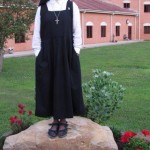For Vocation Awareness Week, it’s worth looking again at Pat Gohn’s excellent piece, How to Grow a Priest:
Here’s something I learned a little too late in life: Faithful priests come from, well, the faithful. The call to the ministerial priesthood grows out of the common priesthood that all the baptized share, since the People of God participate in the Christ’s three offices of priest, prophet and king.
And for good measure, let’s read the thoughts of one young seminarian:
To be a priest is to be a public person. Being a seminarian in a collar means learning how to be that public man, and that spiritual leader; one can’t possibly lead if one cannot be seen. The collar, for good or ill, made me stick out like a sore thumb at parish gatherings. There is an expectation of how one should comport oneself while wearing the collar, and I was acutely aware of it. My task and challenge during the year was to fulfill that expectation “in season and out”; when it was convenient and when it wasn’t; when I was dressed clerically and when I wasn’t.
The time of seminary formation is time spent trying to develop the heart of the Good Shepherd. Wearing the collar helped me do that. It helped me tell the people of St. Josephs that I was theirs, that I existed to serve them. Wearing the collar I represented someone much greater than myself. It is not I who serve, but Christ, whose yoke I wear.
Sisters & Daughters: A father writes on his two daughters decisions to enter the same order:
It started back in May 2001, at a graduation party in my daughter’s tiny New York apartment, just off Broadway, five flights up. Christine has won prizes in classics and Italian, a set of other honors, and she has no use for any of them. She has dropped two decades of aspiration and academic achievement, two decades of building a self in society, two decades of dreams about the future, without so much as a whistle.
“I’m not interested in that any more,” she says. I am proud of her. She has achieved the success we both hoped and worked for—through private schools, travel abroad, summer programs, enrichment opportunities, and family activities. We step out on the roof for some air. One distinguished female scholar, who was on the committee that awarded her a prize for her senior thesis, sidles up: “So what are you going to do with all that Greek and Latin now?” “That’s really up to God, isn’t it,” she replies coolly, meeting her eyes. I keep reminding myself of Thomas Aquinas’ dictum: The end of all learning is love of God. “She is just skipping the middle steps,” I tell myself and others again and again. Who wouldn’t be proud of that? […]
But then, in 2005, I find myself saying with dismay, “You can’t be serious.” Another daughter, Rachel this time, looks at me with deep blue eyes. Her lip quivers. Robert Kaske’s book of medieval sources, my gift to her before she heads to graduate school at Notre Dame, sits on the table, already a relic from another dispensation.
“You are wholly different from Chrissy and wholly unfit for that life,” I insist. “She loves rules and you can’t stand them. You were a feminist at the University of Chicago, and this is a life of submission and obedience.”
She struggles to remain calm. “It’s not a matter of rules or my sister. It’s not even a matter of who I am, and, I’m not sure you know me anymore anyway. Don’t you trust that I have thought about this at length?” Her temperature rises. “Do you really want to argue with joy now and the hope of eternal life later?” she says sharply.
You’ll want to read all of these; they’re all really good.
Sisters of Life: Vocation Stories
When My Sister Entered the Monastery
Lisa Graas, a Passionist Oblate Associate, has more
Related: For Your Vocation
Catholic Parenting in a Facebook Age













